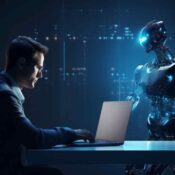
AI Agents: The Next Phase of Autonomous Intelligence
How AI Agents Are Redefining Automation and Workflows
AI agents are not just evolving; they are fundamentally reshaping how humans and machines collaborate. Unlike conventional chatbots, which rely on predefined responses, AI agents are goal-driven, capable of learning, reasoning, and autonomously executing tasks with minimal human intervention.
Recent advancements in multi-agent systems, context-aware AI, and reinforcement learning have enabled AI agents to function across multiple industries, optimizing everything from customer service to financial trading and scientific research.
How AI Agents Work
Unlike traditional AI models like ChatGPT, which generate responses based on a single query, AI agents operate within dynamic environments, make independent decisions, and interact with external APIs, users, or other AI agents to complete objectives.
🔹 The Three Core Components of AI Agents:
- Perception – Agents continuously collect real-time data from various sources, such as:
- User interactions (text, voice, images).
- Databases, live APIs, and IoT sensors.
- Other AI agents in a multi-agent ecosystem.
- Reasoning – AI agents use machine learning models (e.g., LLMs, knowledge graphs, deep reinforcement learning) to:
- Analyze collected data.
- Plan multi-step actions.
- Optimize decision-making based on past interactions.
- Action – The AI agent autonomously executes tasks, which can include:
- Automating workflows (e.g., responding to emails, processing customer orders).
- Making transactions (e.g., executing trades in finance).
Interacting with external tools (e.g., scheduling meetings in a calendar app).
Real-World Applications of AI Agents
🚀 E-Commerce & Customer Support:
- Autonomous Shopping Assistants: AI agents can personalize product recommendations, helping users find the best deals in real-time.
- Automated Refund Processing: Companies like Amazon and Shopify leverage AI agents to analyze refund requests, approve eligible claims, and prevent fraud.
🩺 Healthcare AI Assistants:
- Medical Diagnosis Agents: AI models like DeepMind’s AlphaFold and OpenAI’s Med-GPT are being integrated with AI agents to assist doctors in diagnosing diseases.
- Patient Monitoring Agents: Smart agents in hospitals can track patient vitals in real time and flag any anomalies before they become critical.
💰 Finance & Trading:
- AI Trading Bots: Hedge funds now rely on autonomous AI trading agents that analyze market trends, news sentiment, and real-time data to execute high-frequency trades.
- Fraud Detection Agents: AI models analyze millions of transactions per second to identify fraudulent activities.
The Future of AI Agents
🔹 Multi-Agent Collaboration: OpenAI, DeepMind, and Anthropic are developing multi-agent systems where multiple AI agents interact to solve complex problems beyond human capabilities.
🔹 Decentralized AI Agents: With advancements in blockchain and federated learning, future AI agents will operate privately on user devices, reducing dependency on centralized servers and improving security.
🔹 Autonomous Research AI: Companies are training AI agents to write research papers, conduct scientific experiments, and even develop new materials for space exploration.
🚀 Bottom Line: AI agents are set to become fully autonomous problem solvers, operating at a level beyond single LLMs like ChatGPT.





